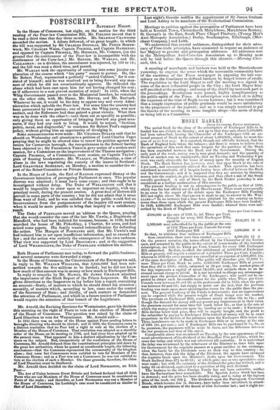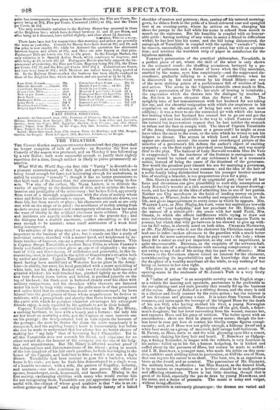MONEY MARKET.
SToCR EXCHANGE. FRIDAY AFTERNOON.
The period fixed for the close of the subscription of Exchequer Bills to be funded was one o'clock on Monday ; and up to that time only about 3,500,0001. bad been subscribed, leaving the Chancellor of the Exchequer with an un- issued amount of Stock to the extent of about 1,500,0004 which he must dis- pose of as he best may. It is reported, though not officially declared, that the Bank of England have taken the balance; and there is reason to believe from the operations of this week that some bargain for the purchase of the Stock has been concluded between the Bank and the Government. During the early part of the week, money was in very great demand ; and the quantity of Stock at market was so considerable, that on Tuesday and Wednesday 6 per cent, was easily obtainable for loans of money upon the security of English Stock. The Bank Broker has, however, since lent upon Stock at the rate of 5 per cent, and consequently relieved the market. This operation has been considered as conclusive of a bargain having been effected between the Bank and the Government ; and it is supposed that they are anxious, by throwing money into the market, to give it firmness, and thus effect a sale of the Stock recently purchased. A sale of Stock by the Bank Broker yesterday is also considered as a further confirmation of this surmise.
The present funding is not so advantageous to the public as that of 1839, which was the last official act of Lord MONTEAGLE. There must consequently be an error in the report of the debate upon the Exchequer Bills Funding Bill last night, where Mr. GOULBURN is made to say, in answer to Mr. Wit- LIAMS—" In no instance had a loan been obtained for the country on better terms than those upon which the present Exchequer Bills have been funded." In 1839, 4,000,000/. Exchequer Bills were funded ; whereof there were sub- scribed by the Bank of England—
Three per Cent. Consols. £500,000 at the rate of 109/. 5s. 2d. Three per Cent. Consols for every 1001. Exchequer Bills,
equal to £546,291 13 0 3,500,000 were subscribed for by the public at the rate of 110/. Three per Cent. Consols for every
100/. Exchequer Bill . 3,850,000 0 0 So that, to withdraw four millions of Exchequer Bills
from circulation, there were then created 4,396,291 13 0 On the present occasion, the terms offered by the Chancellor of the Exche- quer, and accepted by the public to the extent of seven-tenths of the intended subscription are 1121. 2s. Three per Cent. Consols for every 100/. Exchequer Bill subscribed. So that, to effect the withdrawal of 4,000,000 of Exchequer Bills at present, will require a creation of 4,484,000/. Three per Cent. Consols ; whereas in 1839 the same amount was cancelled at an expense of 4,396,291/. 13s. of the same description of Stock. The public will therefore give 87,808/. 7s. more Three per Cent. Stock to retire 4,000,000/. Exchequer Bills at present than they did in 1939; which, estimated at 89 per cent., the market-price of the day, represents a capital of about 78,1504 and subjects them to an in- creased annual charge of 2,634/. It is not intended to charge any mismanage- ment upon the present Chancellor of the Exchequer ; who could not be ex- pected to obtain such favourable terms for the public when Three per Cent. Consols were between 89 and 90, as his predecessor did in 1839, when the price was between 92 and 93; but simply to point out the fact, that the previous funding was made upon more advantageous terms for the public than the pre- sent. The general tendency of the Funds is downwards; and no improvement can be expected while the present weight of Stock hangs over the market. The premium on Exchequer Bills continues steady at from 12s. to 14s.; and though the demand for money will not permit any improvement in their value, the premium cannot for some time fall much below 12s., as that is the rate at which the money-instalments upon the funding are to be made : if Exchequer Bills decline below that price they will be eagerly bought, and the profit to the subscriber by paying in price, Bills instead of money will be in exact proportion to the decline of the premium upon the Exchequer Bills below 12s. Thus, instalments are to be made in Exchequer Bills or in money at the rate of 1001. 12s. per cent.; and if Exchequer Bills can be purchased at 7s., 8s., or 9s. premium, the payments will be made in them, and the difference between the low premium and that of 12s. saved. Considerable alarm was occasioned on Tuesday, by the non-appearance of the usual advertisement of the dividend of the Brazilian Five per Cents., which be- came due today, and which was not advertised till yesterday. It is understood the delay was occasioned by the reluctance of the Minister to draw bills upon his Government for the requisite amount at a great sacrifice in the exchange, when the funds for the Dividends were on their way to this country : ra- ther, however, than risk the delay of the Dividend, the agents have advanced the requisite funds upon the Minister's drafts upon his Government. The Stock declined from 671 to 60 63; at which price one or two speculative sales were made; but with the certainty of the dividend the price has revived, and is today 63 ex-dividend, equivalent to a quotation of 651 with dividend. The business in the other Foreign Funds has not been extensive, neither have the fluctuations been remarkable. The Spanish Active Stock has been in demand ; and the price has been steadily rising, and is today at the highest price of the week, viz. 22fI. The dividends upon the Portuguese Converted Bonds, which become due in January, have today been advertised, in accord- ance with the provisions of the decree of 21st November last; and a slightim-
pulse has consequently been given to these Securities, the Five per Cents. Re- \gency being at 301, Five per Cents. Converted (1841) at 26/, and the Three per Cents. at 181. The only remarkable variation in the Railway Shares has occurred in those of the Brighton line ; which have declined between IL and 2/. per Share, and after being at 6 discount, have rallied slightly, and close about 54 discount.
SAIR,RDAY. TWELVE O'CLOCK. There have been but few transactions this morning, and prices are generally the same as yesterday. Consols for Money have been done at 88/ and 89, and -tha price is now exactly 89; while for Account the quotation has alternated between buyers and sellers at 89/, and there are now buyers at that price. Exchequer Bills are lower, viz. 1 Is. to 13s. prem. In the Foreign Market, the only variation is in Spanish Active Stock, which continues to improve, and -after being at 23, is now 22/ 23. Portuguese Bonds also fully support the im- provement of yesterday, the Five per Cents. Regency being 301 311-, the Three per Cents. 18/ 19, and the Five per Cents. 1841 26* 1.. Columbian are firmer, and have been done at 201 ; while Mexican are rather heavy, being quoted at 25. In the Railway Share-market the business has been chiefly confined to those of the Brighton line, which are firmer, and are quoted at 5i to 5i dis. SATURDAY. Foos o'CLoca.
3 per Cent. Consols Ditto for Account 3 per Cent. Reduced 31 per Cent. Ditto New 31 per Cents Bank Stock Exchequer Bills India Stock Bratilhui 5 per Cents Belgian 5 per Cents buyers 11 13 891 89} shut shut 98/ I shut 295 6 62 4 101 3 Columbian 6 per Cents Danish 3 per Cents .. ex div Dutch 21 per Cents ..... Mexican 5 per Cents. Cons& Portuguese Regency b per Cts. Ditto New 5 per Cents. 1841 Ditto 3 per Cents Russian 5 per Cents ..... Spanish (Active) 201 21 781 51i 25 i 301 i 26e i 184 9 112 113 221 3



























 Previous page
Previous page